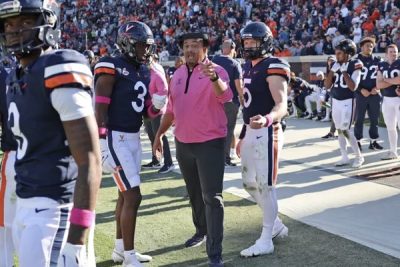UVA’s red-zone woes continue to mount; pass the Pepto please
By Jerry Ratcliffe

Virginia coach Tony Elliott talks things over with Dontayvion Wicks (3) and Brennan Armstrong (5). (Photo: UVA Athletics)
More than four decades had passed since an opponent beat Virginia without scoring a touchdown until Saturday, when a mediocre-at-best Miami team staggered to a four-overtime, 14-12 win at Scott Stadium.
The Cavaliers and Hurricanes spent most of the afternoon kicking themselves to death — eight field goals — before Miami backup quarterback Jake Garcia rumbled into the end zone from three yards out in the fourth overtime for the win (see related game story for the blow-by-blow).
UVA’s defense put up a hair-chested performance, its second-straight game without giving up an offensive touchdown. Defensive coordinator John Rudzinski’s squad surrendered only 272 yards in defeat, making Virginia the only team in the country since 2019 to hold an opponent under 275 yards and no touchdowns and lose a game.
Meanwhile, the Cavalier offense had Tony Elliott reaching for the Pepto.
“I’m sick … my stomach is literally in knots,” the first-year head coach said.
Virginia put up 327 yards, but stunk up the joint in the red zone in front of 43,714 nauseous fans. Tony, pass the Pepto please.
Offensive coordinator Des Kitchings’ offense was abysmal in the red zone when it came to crossing over to the Promised Land — Oh-for-4 in touchdown opportunities — only adding to the misery of being on the nation’s bottom 10 offenses in terms of TD success in the red zone.
The only thing spectators had to show for their presence was that they saw the longest game in UVA history and saw their team lose to an opponent that didn’t score a touchdown for the first time since Rutgers defeated the Cavaliers 3-0 in 1981.
As Virginia dropped its fourth game out of its last five and slipped to 3-5 overall and 1-4 in the ACC on the season, the loss was haunted by a familiar theme: dropped passes, untimely penalties and red-zone dysfunction. Still, after all that futility, the Cavaliers had a chance.
“We needed to make one more play,” Elliott said. “We were three yards away from winning the game.”
The coach was referring to UVA’s possession in the third overtime period. Miami had just kicked a field goal to tie the game at 12-all to end the second overtime. By NCAA rules, teams must settle the game by going for two-point conversions from the 3-yard line after the second overtime, and Miami went first.
UVA safety Antonio Clary did his job, intercepting Garcia’s pass in the end zone, which meant the Cavaliers had one play to score from the 3 and lock up the win.
Kitchings put a man in motion, hoping Miami would reveal its coverage pre-snap, but center Ty Furnish was flagged for a snap infraction, a 5-yard penalty that placed the ball at the 8. The change in distance forced Kitchings to change the play call, and quarterback Brennan Armstrong watched as his pass to wide receiver Dontayvion Wicks sailed out of the end zone.
“We knew [Miami] would be in man-to-man and we had Wicks one-on-one,” Kitchings said. “KT (Keytaon Thompson) and Billy (Kemp) ran a double-out with Lavel (Davis) running the back line, so we could high-low there. The ball [Armstrong threw] was forced and we didn’t come up with that play.”
In the OT rotation, UVA started the fourth extra period at the 3, and this time the target was the rangy 6-foot-7 Davis. Again, Armstrong was pressured by Miami defensive end Jahfari Harvey and the ball to Davis was out of bounds at the back line of the end zone.
Miami scored on a Garcia keep — which was reviewed — to end the game and to extend Virginia’s frustration.
“I saw a lot of players really frustrated after that last two-point conversion,” Rudzinski said. “I want these guys to be frustrated. We’re frustrated as coaches.”
More so, frustration on the other side of the ball, from where there is a glaring lack of success. Virginia entered the weekend ranked No. 123 out of 131 FBS schools in scoring offense, and lived up to its reputation.
“We’re just leaving points on the field,” Elliott said.
Like on Virginia’s opening play of the game, when Wicks was wide open deep and was overthrown by Armstrong, wiping out a potential score. Or back-to-back completions to Thompson and Davis covering 77 yards to open the second half and a first down at the Miami 3. UVA settled for the first of four Will Bettridge field goals.
Then there was a 64-yard catch-and-run by running back Mike Hollins out of the backfield on the next possession. Kitchings planned on attacking Miami underneath in the flats, as was the case with Hollins, who made a defender miss and was off to the races.
Kitchings thought Hollins had scored, but was ruled out at the Miami 2. On third down, UVA resorted to trickeration with Thompson throwing a halfback pass to tight end Grant Misch in the end zone, incomplete. After a time out, they went back to Misch in the end zone and he dropped the ball.
“It’s a combination of things,” Kitchings said about the red-zone woes. “We had a lot of drops. There’s always going to be a call or two I’d like to have back, but we’ve got to execute and give them a better chance down there.”
Virginia was somewhat one-dimensional with Elliott knowing going in that Miami’s front was going to be difficult to run against. Part of the plan was to run Armstrong more (season-high 20 carries for 67 net yards, with 24 yards in losses on five sacks). Other than Armstrong, the Cavaliers’ three tailbacks (Hollins, Perris Jones and Xavier Brown) collectively gained 52 yards on the ground on 13 carries.
So, it came down to Armstrong’s arm, which accounted for 208 yards (64 on one pass, 47 on another and 41 on another), meaning the other 12 passes he completed covered a mere 56 yards.
“It shouldn’t have gone into overtime,” Armstrong said later. “If we had taken care of our business. We’ve got to make plays in the red zone.”
But the Cavaliers aren’t, and until they do, who knows how long this slide toward the bottom of the ACC will last.
Pass the Pepto.








